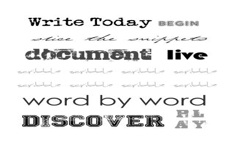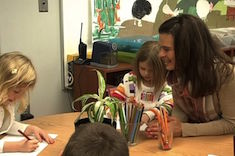At a recent roundtable presentation, the facilitator asked us to think about our core beliefs when it comes to literacy, teaching, and learning. Although I agreed that everything I was hearing is critical—choice, relevance, student-centeredness—the most important belief I have about our work is that teachers should have and share their own literate lives. We should be readers, attentive to the skills we need to make sense of written words, and we should also be writers, aware of the many different skills and processes that must be in place to create a story, report, essay, poem, or other type of written text. Being writers gives us empathy for our students; we understand how it feels to really not be able to think of a way to fill a blank page. We understand how it feels to write a page and realize that it doesn’t work. We understand how it feels to have someone critique our work.
Besides just the empathy we build for our learners when we write ourselves, our students also benefit from seeing us struggle. Writing requires courage and resilience, and when we demonstrate those traits, everyone benefits, and those benefits expand across content areas. Additionally, when teachers share their writing, they also share aspects of their lives. This sharing builds community, which in turn strengthens the learning environment.
So how to share your writing? What are some ways to do it?
-
Keep a notebook. Yes, it takes time, but not an exorbitant amount of it. Commit to writing in it. You might be surprised at how authentically this practice builds your identity as a writer.
-
When you give an assignment, try it out too. Mentor texts are important, and we have amazing published picture books of all genres. However, your students will listen to and relate more to the stories and works that you create and share with them.
-
Instead of using published demonstration pieces, try to create your own. Many writing programs have written work that comes along or is referenced that teachers can use to demonstrate teaching points, but it is much more powerful to use your own work.
Many of the teachers I work with talk to me about their feelings of not being good enough. I wish I could fly a banner that says not to let perfect get in the way of good. Almost every published book on the shelves has been through several drafts, critiques, revisions, agent responses, and editor responses before the final version. Sometimes it’s important to use those mentor texts as teachers of specific craft moves and artistry. However, sometimes it’s important for teachers to think out loud about the decisions they make as writers. When sharing work with students, consider these principles.
-
Be okay with making mistakes. If you are writing in front of students, either on a chartpad or via an overhead projector, model the normalcy of struggling with spelling, skipping a word, or changing your mind about how you were going to write something. Just as you would want students to do, cross out the mistake and keep writing or make an asterisk and add a revision on the fly.
-
Think out loud. Use some of the tools, strategies, and concepts you’ve taught and verbalize your metacognitive work as you do it. If you are struggling, say so. If you are deciding between different options, share them. If you do best with mentally rehearsing before you write, do that mental rehearsal out loud. When students are privy to your process, they may begin to use it. They may also learn to share their own processes more clearly, and you will have more avenues into teaching them.
-
Have your writing with you when you confer or do small-group work. Not only will you increase your repertoire of conferring strategies when you write, but you will also find that your writing will be a readily available tool kit to use as you confer with students during writing workshop.
For almost all of us, it is easier to say I am a reader than to say I am a writer. Practice saying those words. Practice living those words. Pay attention to how it feels to really write. You’ll be amazed at the understandings of the process you will develop and the insights you will have both as a teacher and as a learner.






